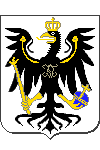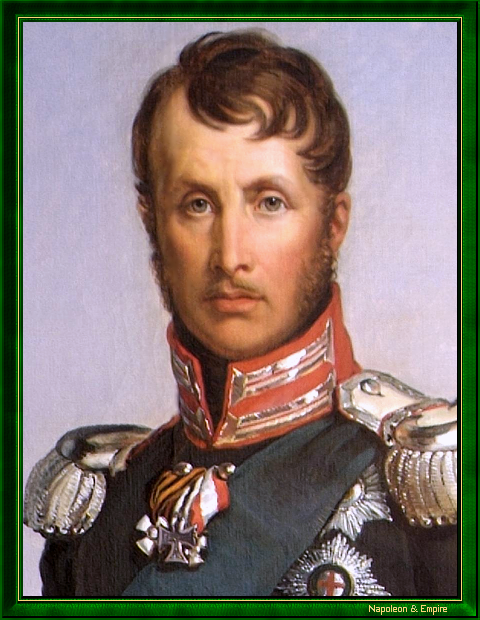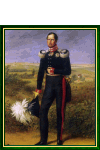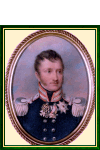Frederick William III
King of Prussia
Pronunciation:

Frederick William of Hohenzollern was born in Potsdam on August 3, 1770, the son of King Frederick William II and Frederica of Hesse-Darmstadt.
In 1793, he married the beautiful Louise de Mecklenburg-Strelitz, who bore him nine children and exerted a considerable influence on him.
On November 16, 1797, he ascended the Prussian throne. As soon as he took office, he had his father's mistress arrested, along with the corrupt ministers and generals he had surrounded himself with. The court lost its frivolous aspect and became austere and puritanical.
The new sovereign intended to pursue a policy of strict neutrality, and not to involve Prussia again in the European conflicts from which it had withdrawn by signing the Peace of Basel two years earlier.
The best possible relations were established between Frederick William and the Directoire, a relationship that was further strengthened by the appointment of Emmanuel Siéyès as ambassador of the French Republic to the King.
The good relations between Paris and Berlin were further strengthened after the 18 Brumaire. Napoleon informed Frederick William that he wished to create a glacis of neutral states in the north of the German Empire, under Prussian influence, which would isolate Austria and guarantee peace. The King declared his willingness to assist the First Consul in this endeavor.
Relations between the two countries began to deteriorate when France seized the Kingdom of Hanover in May 1803, following the breakdown of the Peace of Amiens. By denying English vessels access to the Elbe and Weser rivers, the French occupation of this province dealt a severe blow to Prussian trade.
The conflict escalated in October 1805, when French troops from Hanover, led by Jean-Baptiste Bernadotte, crossed Prussian territory in the course of the German campaign, unaware that the Berlin authorities had forbidden them to do so. Relying on this violation, and with the support of Queen Louise, Tsar Alexander I, who had come to Potsdam on purpose, obtained Frederick William's signature on an ultimatum, which he intended to transmit to France.
A month later, the Austro-Russians were crushed at Austerlitz, and the King of Prussia signed a new treaty, this time with France. Imposed by Napoleon, it provided for an offensive and defensive alliance between the two countries, deprived the King of his possessions in southern Germany, but gave him Hanover in return, to the great displeasure of England. England reacted immediately by declaring war on Prussia and seizing all its ships at sea.
The news that France, in its negotiations with the United Kingdom, was considering returning Hanover to its previous owner, soon convinced Frederick William that Napoleon was playing him. The anti-French party, still supported by the Queen, raised its head, and the King signed the country's readiness for war.
The blitzkrieg that followed was a disaster for Prussia. The country was invaded and devastated by the twin defeats of Jena and Auerstaedt (October 14, 1806). Frederick William had to flee to Koenigsberg and asked for peace. Napoleon refused, offering him a simple armistice with conditions so harsh that the king rejected them, calling on Alexander I to help him.
His intervention ended in failure. After Friedland (June 14, 1807), it was Russia's turn to demand peace. Napoleon initially wanted to exclude Frederick William from the negotiations, but the Tsar refused. So the King and Queen of Prussia went to Tilsitt, where they were dictated draconian peace terms. Their kingdom lost half its surface area, including Hanover; the country's capital and main squares were occupied; and a 200 million indemnity had to be paid to France, in addition to the ordinary contributions now levied by the occupier.
Frederick William III did not return to Berlin until after the Erfurt interview in September 1808, and the departure of the occupying troops. He found empty coffers and a miserable, exasperated population. Hatred of France reached such heights that officers and soldiers alike deserted to fight alongside the Austrians, jeopardizing the king's laborious policy of balance to avoid irritating his conqueror.
In 1812, a corps of 20,000 Prussians, commanded by General Ludwig Yorck von Wartenburg, took part in the Russian campaign, forming the rearguard of Marshal Etienne Macdonald's X Corps. At the end of December, Yorck, perhaps with the King's approval, signed a neutrality agreement with the Russians and turned against the French.
Three months later, Frederick William declared war on France. His army took part in the battles of 1813 and 1814, often decisively, and brought him as far as Paris, where he entered at the same time as Alexander I.
He then travelled to England, where he received a triumphant welcome, and on to Vienna, Austria. It was there, during a congress session, that he learned of Napoleon's return. His reaction, for once, was swift and vigorous. He called his subjects to arms and, under the command of Gebhard Leberecht von Blücher, formed an army known as the Silesian Army, which soon played a major role in the victory at Waterloo, saving Arthur Wellesley, Duke of Wellington, from imminent disaster.
In the treaties reorganizing Europe, the King of Prussia obtained compensations commensurate with the disasters he had suffered in previous years. He initially intended to impose the most humiliating conditions on France, but renounced them in exchange for the Saar, part of Alsace, half of Saxony, a contribution of 300 million francs and the maintenance for three years, at the expense of the vanquished, of a 70,000-strong Prussian corps. His state grew from five to thirteen million inhabitants.
Frederick William then resumed his policy of neutrality, while cultivating the Russian alliance. Widowed in 1824, he married Augusta von Harrach for the second time. In 1834, he founded the Zollverein, the forerunner of the Second Reich.
He died in Berlin on June 7, 1840. He was succeeded by his eldest son, Frederick William IV.
"Frederick William III, King of Prussia" by François Pascal Simon Gérard (Rome 1770 - Paris 1837).

Napoleon held the King of Prussia in low esteem. He came to see me at Tilsitt with the intention of speaking to me about something, but never dared to do so...
Ludwig van Beethoven dedicated his Ninth Symphony to him in 1826.
Other portraits

"Friedrich Wilhelm III.". Full-length portrait painted in 1829 by Ernst Paul Gebauer (Lietzen 1782 - Berlin 1865).

"Frederick William III, King of Prussia". Thumbnail by Jean-Baptiste Isabey (Nancy 1767 - Paris 1855).